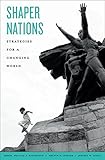Shaper nations : strategies for a changing world / edited by William I. Hitchcock, Melvyn P. Leffler, Jeffrey W. Legro.
Material type: TextPublisher: Cambridge, Massachusetts : Harvard University Press, 2016Copyright date: ©2016Description: 1 online resource (vi, 218 pages)Content type:
TextPublisher: Cambridge, Massachusetts : Harvard University Press, 2016Copyright date: ©2016Description: 1 online resource (vi, 218 pages)Content type: - text
- computer
- online resource
- 9780674969254
- 0674969251
- International relations
- World politics -- 21st century
- Security, International
- National security -- United States
- International organization
- Relations internationales
- Politique mondiale -- 21e siècle
- Organisation internationale
- international relations
- POLITICAL SCIENCE -- Government -- International
- POLITICAL SCIENCE -- International Relations -- General
- International organization
- International relations
- National security
- Security, International
- World politics
- United States
- Weltpolitik
- Geopolitik
- Internationaler Vergleich
- 2000-2099
- 327.101 23
- JZ1313 .S534 2016eb
| Item type | Home library | Collection | Call number | Materials specified | Status | Date due | Barcode | |
|---|---|---|---|---|---|---|---|---|
 Electronic-Books
Electronic-Books
|
OPJGU Sonepat- Campus | E-Books EBSCO | Available |
Includes bibliographical references and index.
Introduction: Making strategy in the twenty-first century / William I. Hitchcock -- Brazil: shadows of the past and contested ambitions / Matias Spektor -- China: security dilemma and "win win" / Men Honghua -- Germany: between power and responsibility / Constanze Stelzenmüller -- India: modernization in a safe neighborhood / Srinath Raghavan -- Israel: strategic vision adrift / Ariel E. Levite -- Russia: geopolitics and identity / Fyodor Lukyanov -- Turkey: populism and geography / Yaprak Gürsoy -- United States: grappling with rising powers / James B. Steinberg -- Conclusion: the world they will make / Jeffrey W. Legro.
"International order is being remade by new "shapers"--Emerging powers that are increasingly assertive in world affairs. Controversies rage about the trajectory of Chinese strategy, the revival of Russian ambitions, the ascent of India, the reconfiguration of Middle East politics, the return of Germany to geopolitics, and the mounting power of Brazil in the Western Hemisphere. Rarely do scholars and commentators think comparatively about the strategic calculations, politics, and impact of these powers in relation to one another and to the United States. What will the shapers do and why? How should the United States respond? What kind of world will they create? The conventional wisdom on national strategy suggests these shaping states have clear central authority, coherently connect means to ends, and focus on their geopolitical environment. The chapters in this edited volume suggest a different conclusion. In seven critically important countries--Brazil, China, Germany, India, Israel, Russia, and Turkey--strategy is dominated by nonstate threats, domestic politics, the powerful and distorting effect of history and national identity, economic development concerns, and the sheer difficulty, in the face of so many powerful internal and external constraints, to pursue an effective national strategy. The United States, in responding to these seven shaper states, must comprehend these sources of strategy."--Provided by publisher.
Online resource; title from PDF title page (EBSCO, viewed March 24, 2016).
In English.
eBooks on EBSCOhost EBSCO eBook Subscription Academic Collection - Worldwide
There are no comments on this title.

